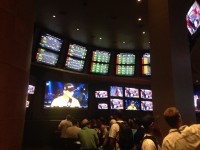Inside the Sportsbooks: How the Sportsbook Tries to Balance the Action

Sportsbooks are for-profit businesses. They will do anything possible to ensure they turn a profit. That doesn’t mean some players can’t win, just like some players win on slots, blackjack, etc. But the house will always win as long as the house runs the place the right way.
On slots, the machines are rigged in favor of the house. There’s absolutely nothing for the casino to do other than put the machines out on the floor and let gamblers throw away their money. At the blackjack table, the only way the house can be defeated in the long-run is if too many card counters play there. So to prevent that from happening, casinos ban card counters once they catch them.
A sportsbook is completely different. The house must make adjustments to the wagers in order to ensure they win. Prior to each game, the sportsbook sets an opening line. This line is merely a way to entice instant action, hopefully on both sides. The sportsbook does everything in their power to entice equal action on both sides. So if the Jets are –4.5 against the Colts, they want as much wagered on the Jets as they do the Colts.
When the sportsbook gets equal action on both sides, they can’t lose. If there is $110,000 wagered on the Jets and $110,000 on the Colts, that means one side is going to win $100,000 (-110 odds) and one side is going to lose $110,000. The house profits $10,000.
The Sportsbook’s Balancing Act
In a dream world, the sportsbook would get equal action on both sides from the initial line. But that doesn’t happen often. In NFL games, for example, a line is posted the week before (sometimes earlier) and the general public is then given an opportunity to place their bets.
The sportsbook then monitors how much is being wagered on each side. If the action is fairly close, the line remains the same. At this point, there’s no need to change the line. The sportsbook is getting what they want. But if one side is bringing in far more money than the other, the sportsbook must adjust the line to entice more action on the other side.
Going back to the example above, let’s say the bettors are wagering heavily on the Jets and not-so heavily on the Colts. Depending on the difference in wagers, the sportsbook will then adjust the Jets line from anywhere between 0.5-1 point, maybe even more if the difference is extreme.
After the line shifts, the sportsbook must make another assessment. Sometimes the new lines ends up bringing too much action on the other side. And sometimes the new line doesn’t do anything. If the new line still isn’t balancing things out, the sportsbook will then re-adjust the line.
Sportsbooks will do anything they can to get even money on both sides. If that happens, they can’t lose. But the problem is they can’t always do this. There are many games where the sportsbooks get destroyed because they were unable to get equal action. But, just as many times, there are games the sportsbooks win big.
















